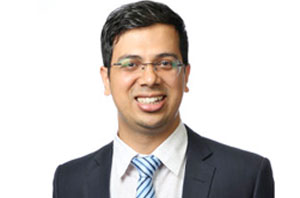Dr. Bishal Gyawali, based at Queen’s University, is an expert in global oncology, cancer policy, evidence-based oncology, financial toxicities of cancer treatment, clinical trial methods, supportive care, and global oncology.
The emergence of new cancer therapies and improved methods to screen for and diagnose cancer have led to marked improvements in survival rates for cancer patients. However, survival rates do not tell the whole story – a patient’s quality of life can be just as important. That is why Dr. Bishal Gyawali is interested in taking a value-based approach to cancer care. Gyawali, a newly appointed OICR Investigator based at Queen’s University, is using evidence, education and communication to deliver his message to stakeholders in the cancer care system.
“Every society has a limited amount of resources that they can devote to cancer care. We need to be sure that we are using these resources wisely by selecting proven, high-value interventions that have evidence of improving the duration and quality of patients’ lives,” says Gyawali. “When we are making policy and clinical decisions about a new cancer drug, we need to be asking what the societal value is. For many of the new cancer drugs there isn’t strong evidence that they actual improve a patient’s survival or quality of life.”
Gyawali, who is from Nepal, explains that he first became interested in this area of research working in Japan and then in the U.S. “Working in these high-income countries was eye-opening. I saw that yes, there were lots of resources, but a significant amount was being spent on things that were not helping patients,” says Gyawali.
To combat this issue, Gyawali has published several research articles to inform policy and has personally been involved in advocacy and policy works through his membership in committees and working groups of organizations such as the American Society for Clinical Oncology, the European Society for Clinical Oncology and the WHO-Essential Medicines List for Cancer Drugs with the ultimate goal to identify and reduce the use of unhelpful and low-value treatments and to educate physicians through these groups.
Gyawali is also trying to increase stakeholders’ understanding of clinical trial results. “My goal is to educate patients, clinicians and advocates about how to properly interpret the results of a clinical trial, so they have a clear picture of a drug’s potential benefits as well as its risks,” explains Gyawali. “Only when we truly understand what the data is telling us and how the trial was conducted can we best choose the right course of action.”
Making decisions about their treatment is just one of a number of challenges faced by cancer patients and their families. “There is a financial toxicity associated with cancer treatment,” says Gyawali. “Even though some of the costs of treatment may be covered by universal healthcare systems or private insurance, there are still many other financially damaging effects from cancer treatment. For example, the loss of wages, the costs of travel and parking as well as supportive care if needed. This added stress can have a significant negative impact on a patient’s quality of life. I want to help find ways to address these issues.”
Through his research, Gyawali wants to not only improve cancer care in Ontario, but worldwide, with a focus on low- and middle-income countries. “The global burden of cancer is immense and growing. Identifying interventions that are proven and affordable that can be deployed in these countries is essential to increasing equity in cancer care. There are lessons we can learn from low-and-middle-income countries for the benefit of Ontario and lessons Ontario can teach to the world as a leader in cancer care and research,” says Gyawali, a member of the Queen’s University Global Oncology Program.
Since coming to Ontario as a Clinical Fellow at Queen’s in 2019, Gyawali has gained an appreciation of the elements that make Ontario an ideal place to carry out this type of research. “Ontario has a world class community of researchers and some unique resources that have proven very beneficial to my research,” says Gyawali. “For example, the database maintained by ICES is an invaluable resource for finding evidence to support a value-based approach to care.”
Gyawali, who is now an Associate Professor in the Department of Medical Oncology at Queen’s is happy to be continuing his research in Ontario with the support of OICR. “This award from OICR helped me secure a faculty position at Queen’s and has allowed me to confidently plan my academic work. It also provided a sense of validation about my research and is great encouragement to continue,” says Gyawali. “It is fantastic that the Institute is supporting young researchers such as myself. I am excited to immerse myself in the OICR community and contribute to improved cancer policy and care in Ontario and worldwide.”


